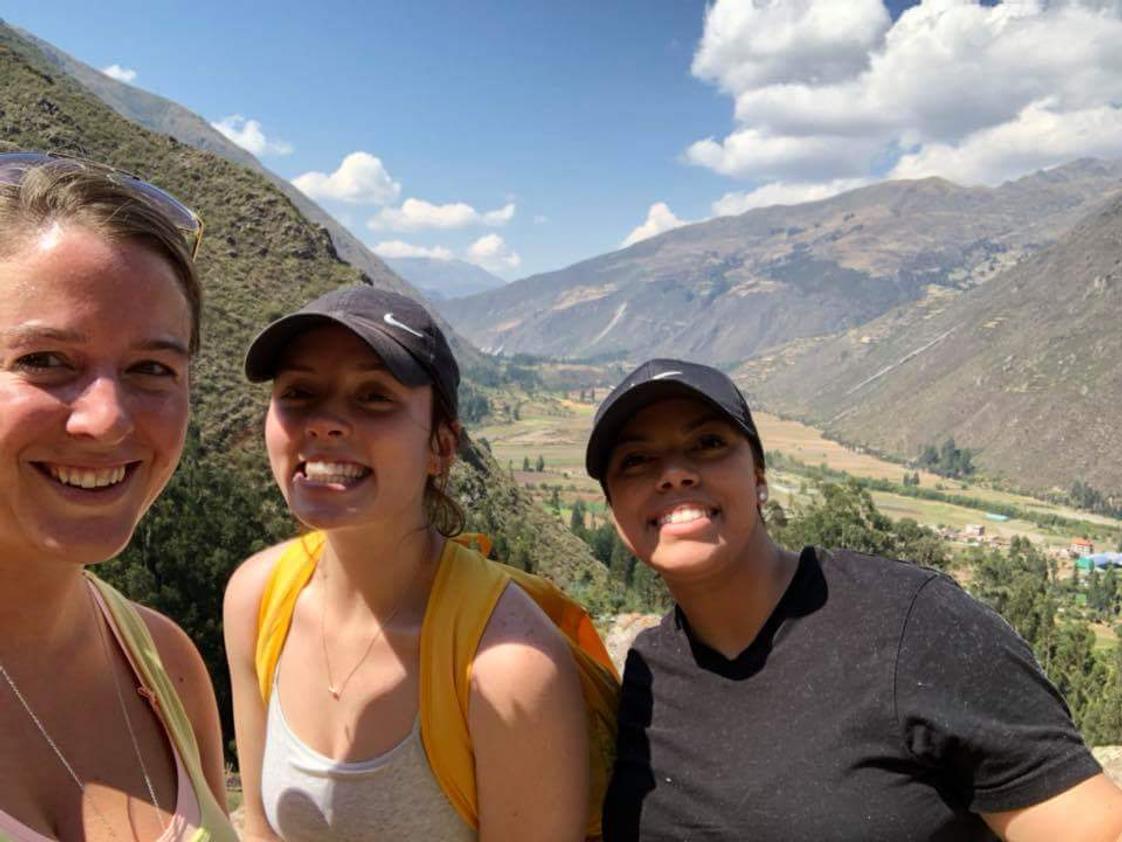- Mount Wachusett Community College is an accredited, public two-year institution serving 29 cities and towns in North Central Massachusetts. The 269-acre main campus is located in Gardner, Massachusetts. Satellite sites are located in Leominster, Fitchburg, and Devens. The college offers over 70 associate degree and certificate programs, as well as adult education/high school completion programs, education and training for business and industry, and noncredit continuing education programs. MWCC students enjoy many support services and resources including Mount Fitness, the gym and wellness center and the 555-seat Theatre at the Mount.
School Highlights
Mount Wachusett Community College serves 3,915 students (21% of students are full-time).
The college's student:teacher ratio of 7:1 is lower than the state community college average of 12:1.
Minority enrollment is 40% of the student body (majority Hispanic), which is less than the state average of 57%.
Quick Stats (2025)
- Enrollment: 3,915 students
- In-state tuition: $5,068
- Out-state tuition: $9,988
- Student:teacher ratio: 7:1
- Minority enrollment: 40%
- Source: Verified school update
School Overview
The teacher population of 595 teachers has stayed relatively flat over five years.
Mount Wachusett Community College
(MA) Community College Avg.
Carnegie Classification
Associate's Colleges: High Career & Technical-High Traditional
Associate's Colleges: Mixed Transfer/Career & Technical-Mixed Traditional/Nontraditional
Institution Level
Less than 2 yrs
At least 2 but less than 4 years
Institution Control
Public
Public
Total Faculty
595 staff
290 staff
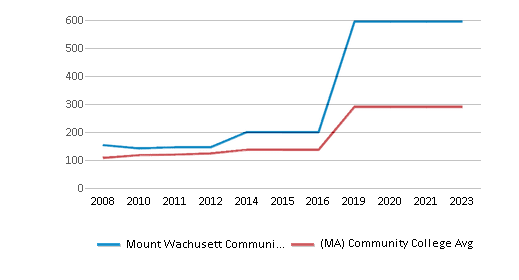
School Calendar
Student Body
The student population of Mount Wachusett Community College has grown by 6% over five years.
The student:teacher ratio of 7:1 has increased from 5:1 over five years.
The Mount Wachusett Community College diversity score of 0.59 is less than the state average of 0.74. The school's diversity has grown by 10% over five years.
Total Enrollment
3,915 students
2,106 students
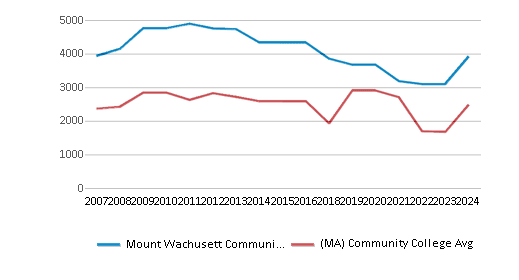
Student : Teacher Ratio
7:1
12:1
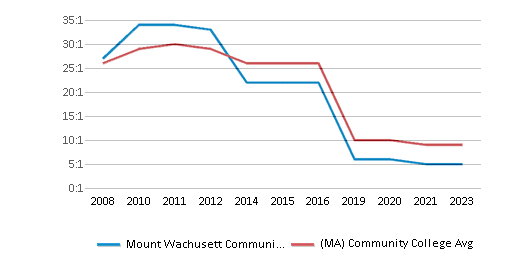
# Full-Time Students
822 students
1,039 students
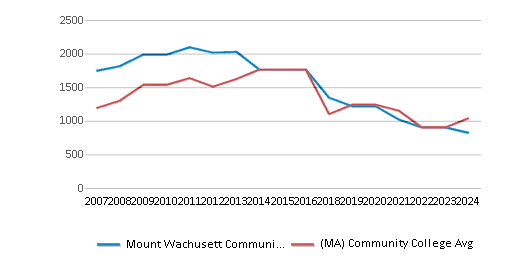
# Part-Time Students
3,093 students
1,619 students
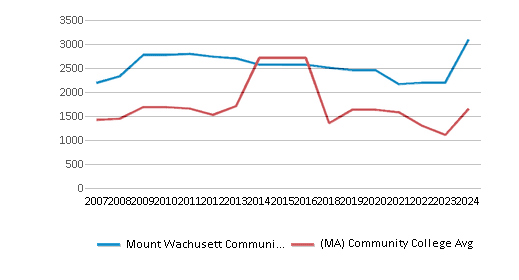
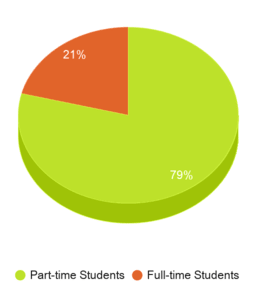
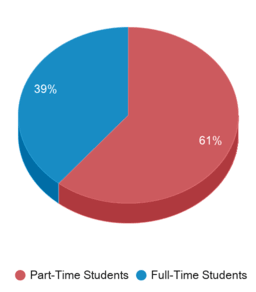
# Enrollment Undergraduate
391 students
278 students
# Full-Time Undergraduate Students
822 students
839 students
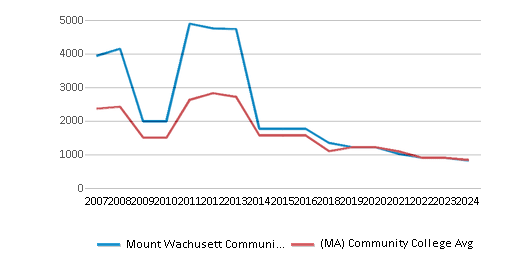
# Full-Time Graduate Students
n/a
99 students
# Part-Time Undergraduate Students
n/a
1,619 students
# Part-Time Graduate Students
n/a
83 students
Total Dormitory Capacity
n/a
443 students
% American Indian/Alaskan
n/a
n/a
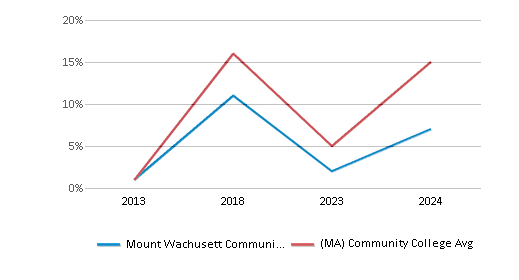
% Asian
3%
6%
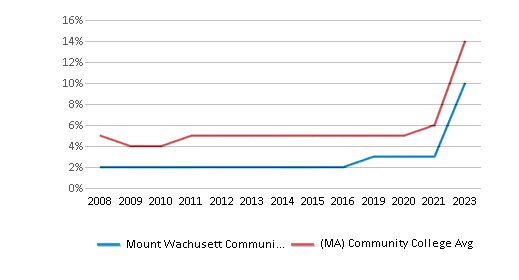
% Hispanic
20%
21%
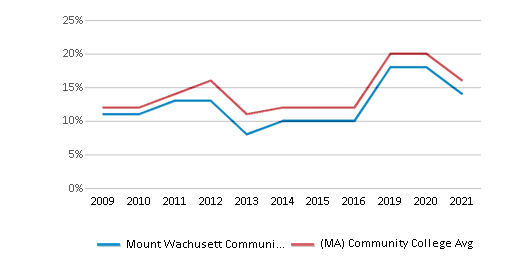
% Black
11%
15%
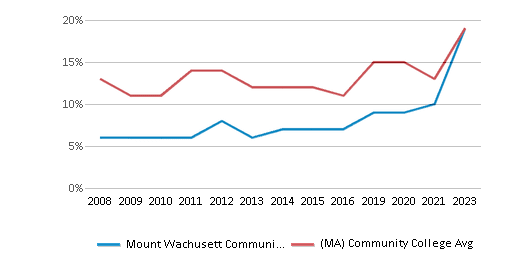
% White
60%
43%
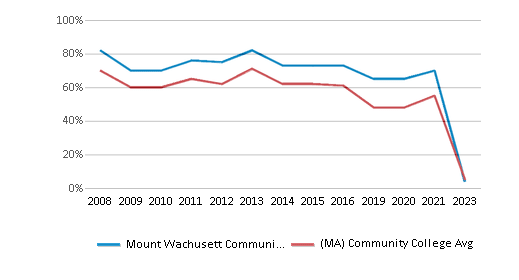
% Hawaiian
n/a
1%
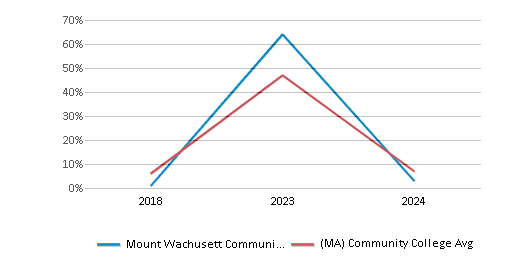
% Two or more races
4%
3%
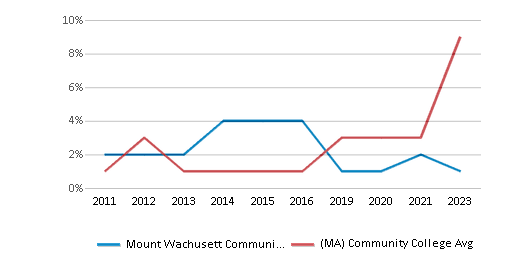
% Non Resident races
n/a
2%
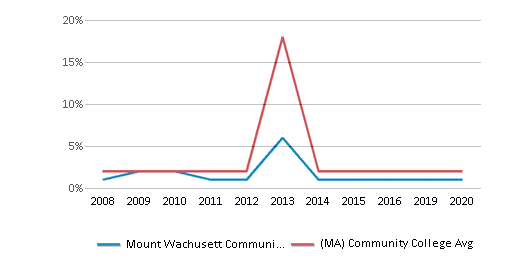
% Unknown races
2%
9%
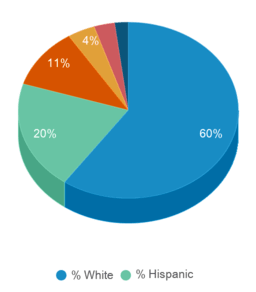
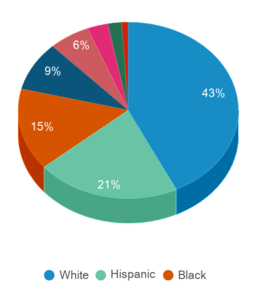
Diversity Score
0.59
0.74
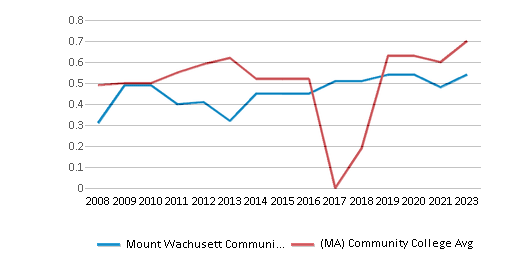
College Completion Rate (Students who graduate in less than 4 years)
0.2716%
0.2128%
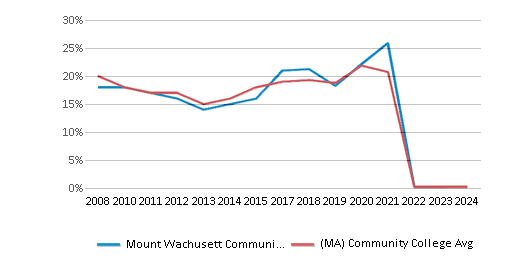
College Completion Rate (Students who graduate in 4 years or more than 4 years)
n/a
0.4706%
Average Graduate Earnings (10 Years)
$33,800
$35,500
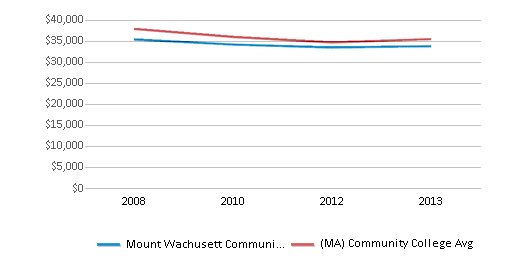
Tuition and Acceptance Rate
The public in-state tuition of $5,068 is more than the state average of $4,424. The in-state tuition has declined by 10% over four years.
The public out-state tuition of $9,988 is more than the state average of $9,401. The out-state tuition has declined by 5% over four years.
In-State Tuition Fees
$5,068
$4,424
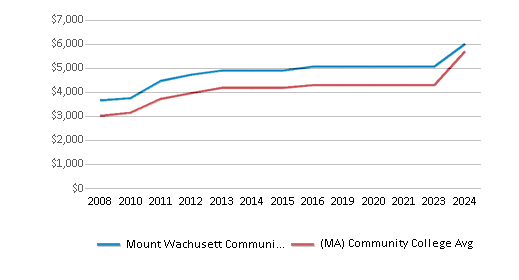
Out-State Tuition Fees
$9,988
$9,401
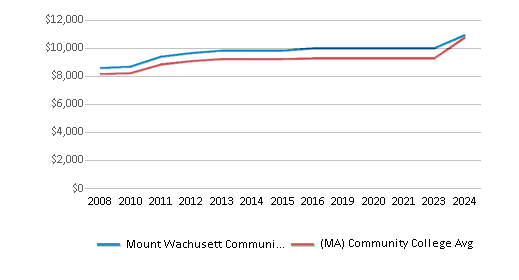
% Students Receiving Some Financial Aid
79%
87%
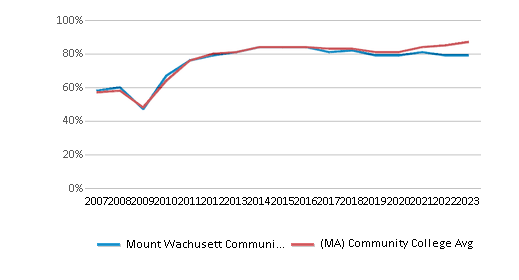
Median Debt for Graduates
$10,284
$12,000
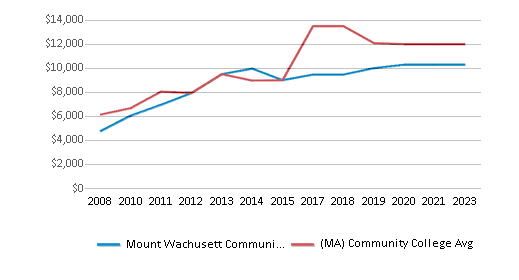
Median Debt for Dropouts
$3,910
$5,500
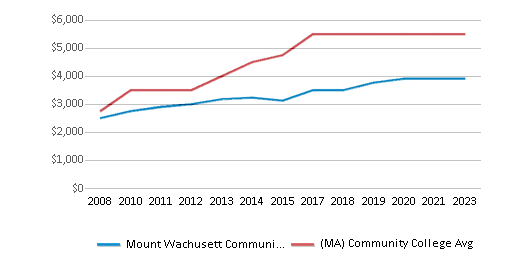
Acceptance Rate
n/a
75%
SAT Reading
n/a
540
SAT Math
n/a
535
SAT Writing
n/a
480
ACT Composite
n/a
21
Source: 2024 (or latest year available) Integrated Postsecondary Education Data System (IPEDS) , School Administrators
School Notes
- MWCC is a learning community committed to quality instruction, innovative curriculum, and personalized support. Providing a supportive, creative learning environment for students, faculty, and staff is a high priority. The college is committed to building and maintaining a supportive learning environment that values creativity and diverse perspectives and contributions of all members of the community. We are responsible for equipping our students with essential learning skills to be successful lifelong learners able to adapt easily and acquire new knowledge and skills for a changing world. MWCC's main campus is in Gardner and its satellite campuses are located in Leominster (Leominster Campus & Corporate Training Center), Fitchburg, Athol, Orange, and Devens (Shriver Job Corps, Devens Learning Center, and the Devens Center). The main campus includes an academic building with fully-equipped classrooms, laboratories, studios, library and theatre. In addition, the MWCC Fitness & Wellness Center offers a gymnasium, athletic field, running track, racquetball courts, pool, weight room, and fitness center. MWCC offers its students education for a changing world. Our students learn from dynamic, dedicated faculty in small classes. At the Mount you will receive individualized attention, not only in the classroom, but all across the campus through a wide variety of student services including tutoring and counseling. Mount Wachusett Community College (MWCC) is accredited by the New England Association of Schools and Colleges (NEASC) Inc., a non-governmental, nationally recognized organization whose affiliated institutions include elementary schools through collegiate institutions offering post-graduate instruction.
Frequently Asked Questions
How much does Mount Wachusett Community College cost?
Mount Wachusett Community College's tuition is approximately $5,068 for In-State students and $9,988 for Out-State students.
Recent Articles

Obtaining Your Bachelor's Degree at a Community College
Explore the evolving landscape of community colleges offering bachelor's degrees, addressing affordability, accessibility, and workforce needs.

A to Z of Community College Certificates and Courses
From business and healthcare to technology and skilled trades, the article showcases the breadth of options available to students seeking to enhance their knowledge, develop new skills, or pursue career advancement.

What is a Community College?
This comprehensive guide explains what a community college is, its history, and its role in higher education. It covers the types of programs offered, differences from four-year colleges, benefits of attending, and important considerations for prospective students, providing valuable insights for those exploring educational options.



